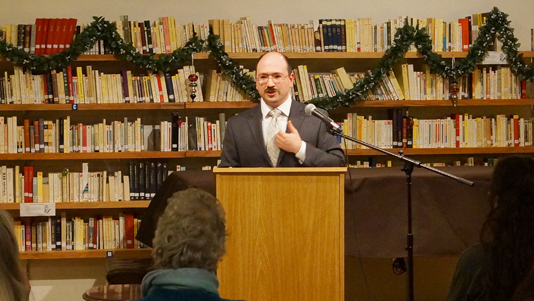US International Tax Lawyer Lectures at Alliance Française on Offshore Reporting
On December 7, 2016, Mr. Eugene Sherayzen, the founder of Sherayzen Law Office and a US international tax lawyer, gave a lecture at the Minneapolis chapter of Alliance Française. The topic of the lecture was an introduction to reporting of foreign income and foreign assets for individual taxpayers in the United States. The lecture was well-attended and raised a lot of interest among the participants.

US International Tax Lawyer Explained the US Tax Residency Requirements
Mr. Sherayzen first focused on defining the crucial term of “US tax resident”. As he explained during the lecture, the starting point for legal analysis of any US international tax lawyer is often the determination of whether his client is a US person.
During the lecture, Mr. Sherayzen covered three categories of US tax residents – US citizens, US Permanent residents and individuals who met the requirements of the Substantial Presence Test.
He also distinguished the immigration-law concept of US permanent residency (i.e. green-card holders) from the tax concept of US tax residency. The US international tax lawyer also discussed certain exceptions to the Substantial Presence Test, focusing on F-1 and J-1 visas.

US International Tax Lawyer Emphasized Worldwide Income Reporting Requirement
Then, Mr. Sherayzen explained to the audience that US tax residents are required to disclose and pay US taxes on their worldwide income, even if this income was already disclosed on foreign tax returns.
At that point, the US international tax lawyer observed that the worldwide income reporting requirement is one of the most violated laws. Mr. Sherayzen distinguished three groups of US tax residents who are not in compliance with this law.
The first group consisted of US tax residents who were born overseas and were not aware of the worldwide income compliance requirement due to their prior experiences in their home countries (especially those which adopted the territorial model of taxation).
The second group was described as a small group of persons who were aware of the requirement and willfully violated it.
Finally, Mr. Sherayzen distinguished a third group of individuals who knew about the worldwide income reporting requirement, attempted to comply with it to the best of their ability, but failed to do so due to their lack of sufficient knowledge of US tax laws. The US international tax lawyer specifically referenced the Assurance Vie accounts as a representative case for such violations due to huge differences between the US and the French tax treatment of these accounts.

US International Tax Lawyer Described Top Three Reporting Requirements with Respect to Foreign Bank and Financial Accounts
The third part of the presentation was devoted to the discussion of the FBAR, Form 8938 and Form 8621 (PFIC passive foreign investment company) requirements with respect to reporting foreign bank and financial accounts. The discussion concerned the types of accounts that needed to disclosed, the reporting thresholds, the due dates and how the forms needed to be filed. Some history of the forms was provided; due to time limitations, however, only a limited introduction to FATCA was provided to the audience.
This discussion produced a lively Q&A exchange between the US international tax lawyer and the audience.

US International Tax Lawyer Discussed the Reporting of Foreign Gifts and Inheritance
The fourth part of the discussion concentrated on the Form 3520 reporting of foreign gifts and inheritance, including the filing threshold and the penalties associated with the form. Mr. Sherayzen also explained that, in certain circumstances, Form 8938 may be applicable to foreign gifts and inheritance for the purpose of annual tax compliance.

US International Tax Lawyer Introduced the Hypothetical to Illustrate How These Forms Might Apply in a Real-Life Situation
The final part of the presentation was devoted to the analysis of a hypothetical to demonstrate how all of these information returns could apply in a real-life situation. The focus of the hypothetical was on the French and French-Canadian issues. Mr. Sherayzen also invited the audience to participate in the legal analysis of the hypothetical which was enthusiastically welcomed by the audience.
The presentation concluded with an additional fifteen-minute Q&A session.



